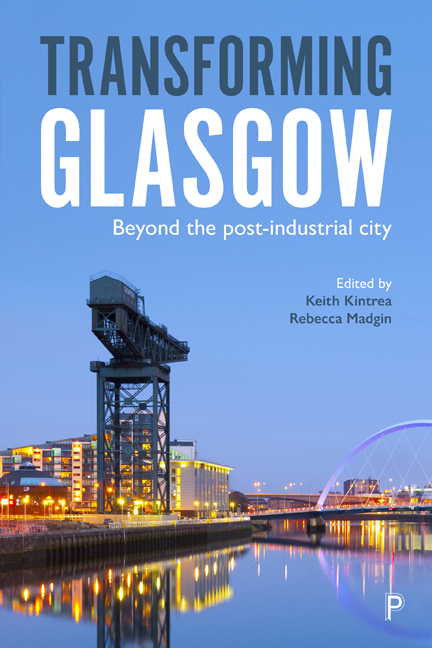Book contents
- Frontmatter
- Contents
- List of Maps, Tables, Figures and Boxes
- Notes on Contributors
- Acknowledgements
- Foreword
- Map
- Introduction: Transforming Post-Industrial Glasgow – Moving Beyond the Epic and the Toxic
- PART I
- PART II
- PART III
- Conclusion: Beyond the Post-Industrial – Narratives of Time and Place
- Index
13 - Our ‘Dear Green Place’: Glasgow’s Transformation from Industrial Powerhouse to Sustainable City
Published online by Cambridge University Press: 25 March 2021
- Frontmatter
- Contents
- List of Maps, Tables, Figures and Boxes
- Notes on Contributors
- Acknowledgements
- Foreword
- Map
- Introduction: Transforming Post-Industrial Glasgow – Moving Beyond the Epic and the Toxic
- PART I
- PART II
- PART III
- Conclusion: Beyond the Post-Industrial – Narratives of Time and Place
- Index
Summary
Urban areas are hot spots of complex and dynamic interactions between society and ecosystems.
Frank, Delano and Schaefer Caniglia (2017, p 1)Urban pressures and sustainability
In the three decades since Gro Harlem Bruntland's influential report, ‘Our Common Future’, when the term ‘sustainable development’ was coined (United Nations, 1987), global cities and their ecosystems have been under increasing human and environmental pressure (Seto et al, 2011). Human pressures include rapid urbanisation, increasing population density and the energy consumption, waste, pollution and habitat loss associated with this densification. Environmental pressures include changing rainfall, temperatures and sea levels which are increasing flood, wind and heat risks to society, infrastructure and urban ecosystems. In post-industrial cities such as Glasgow, these pressures influence and are influenced by prior environmental degradation including contaminated land and water, as well as large tracts of vacant and derelict land. European environmental legislation from the 1970s onwards, and especially from the 1990s, has led to notable improvements in the quality of the natural areas and water in cities and the range of ecosystem services these features provide. However, many environmental challenges remain and/or are increasing including air pollution, biodiversity loss and the impacts of climate change. Globally, cities are having to develop new ways to manage these environmental impacts as well as tackling pressing social, health and economic concerns. In Glasgow these issues are particularly acute due to the post-industrial environmental and social context within which these issues play out.
Successfully managing post-industrial cities where there are pressing environmental concerns, reduced social spending and a need for continued economic growth brings both challenges and opportunities. For Glasgow, public health and the city's natural and built environment are intrinsically linked. Its large tracts of derelict and vacant land that make up 9 per cent of the city's surface are strongly linked with social deprivation and economic blight (Maantay, 2013). However, these spaces have strong potential to be repurposed into vibrant, productive spaces that could greatly enhance the city's environmental sustainability and resilience, bringing transformative social and economic benefits. Indeed, initiatives by the city council are forward-thinking and aspire to deliver this change, for example, ‘Sustainable Glasgow aims to make this city one of the greenest in Europe [within a decade of 2010]’ (GCC, 2018b, p 1).
- Type
- Chapter
- Information
- Transforming GlasgowBeyond the Post-Industrial City, pp. 257 - 278Publisher: Bristol University PressPrint publication year: 2019

